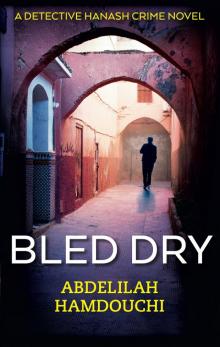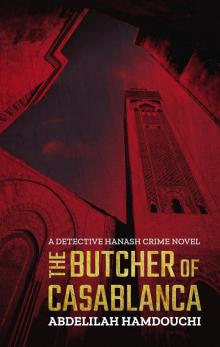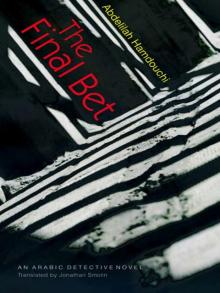- Home
- Abdelilah Hamdouchi
The Butcher of Casablanca Page 2
The Butcher of Casablanca Read online
Page 2
Another element of his system was the excellent technique he had established for obtaining confessions through “soft torture,” which left no marks as it relied primarily on psychological pressure that combined lures and threats, traps and tricks, wearying suspects to the point that they’d say whatever they were told to say.
Nor should we forget his detective’s nose, which, like a sixth sense, enabled him to form an impression of a person the moment he met them and guided how he conducted his interrogations. Then, with an ear attuned to changes in the pitch of the suspect’s voice and the rhythm of his or her breathing, he’d cull the truth from the verbal chaff. Finally, we must mention his trademark piercing investigator’s glare that made you shiver and avert your eyes for fear of the torrent of accusations about to assail you.
Hanash was usually surrounded by people and rarely had time for himself. As soon as he woke, he’d find several urgent cases on his plate. He had to interrogate thieves and murderers, hear dozens of false confessions, shatter masks, and spend endless hours listening to lies told by suspects and witnesses. He also had to supervise his team, head out to crime scenes or to the morgue, and plow through reams of technical reports that, more often than not, had little useful substance for his work.
Five months ago, during a high-profile case in which a prostitute and her lover were found brutally murdered, one of his inspectors shot him at point-blank range in his office. Miraculously, he survived, but was in a coma for three days. He felt no pain, no comfort, no sense of whether he was alive or dead. But at one point, while he lay there on that hospital bed, immobile and attached to life by feeding tubes, he saw an angel standing at the foot of his bed saying, “God loves you, Hanash. That’s why he sent someone to drive a bullet into your chest.”
After he came to, those words stayed with him and, to his amazement, he saw his character undergo several changes. It was as though he truly were a snake changing its skin; as though he were a man who’d been living on some other planet and had come back to Earth. He saw his life pass before him: a train of lying, greed, betrayal, egotism, abuses. He shed streams of tears and realized there was another world out there. A purer world, even if being a policeman was a filthy job.
After a short period of recovery, Hanash returned to work, albeit slowly. One of the first things he did was to move out of the office where he was shot. He also changed his attitude toward his men. In the past he had viewed them with suspicion and vested absolute power in the officer he had chosen to spy on them, despite that officer’s low rank. It was that same officer who shot him and who then took his own life in desperation when it was discovered he had stolen money from a crime scene. It goes without saying that, after the surgery, Hanash was incredibly feeble. He could not even urinate standing up. He no longer entertained pretty women like he had in the past. He even cut off his longstanding affair with dear Bushra, the village girl he’d met in Tangiers.
The car sped through the empty streets. There was no traffic at this early hour on Saturday, the first day of the weekend. The trip promised to be quick and pleasant. Naeema flicked through the radio channels in search of popular tunes suitable for a family occasion. She nodded rhythmically and hummed along to the music. Manar rested her head against the window and tried to sleep. Tarek cracked open a detective novel and began to read.
They were driving as fast as the law permitted in the city. Naeema was holding her breath until they passed the city limits and made it to the highway.
She sighed and said, “Oh, Atiqa, you’re so far away in Marrakesh. If only you could live here. I could be by your side and help you bring up your children.”
“Property is cheaper in Marrakesh than in Casablanca. Her husband was able to buy an apartment,” Hanash said, his eyes on the road.
“They had to borrow,” scoffed Manar, her eyes still closed.
Before Naeema could respond, she heard the sound she had dreaded. Hanash’s phone rang once, twice, a third time. He exchanged nervous glances with his wife as he slowed the car.
“Who’d call me up at this time in the morning?”
Naeema mouthed a silent prayer.
Before she could beg him not to answer, he pressed “reply” and held the phone to his ear as he kept his eyes on the road. He listened attentively for a full minute, uttering only brief expressions of deference and respect as he pulled over to the side of the road. Finally, he bowed his head as though in the presence of the caller and said, “Yes, sir, I’m on my way to Marrakesh to congratulate my daughter on her newborn son. No, we haven’t reached the highway yet. . . . Yes, sir. . . . Of course, sir.”
Naeema felt a sharp spasm in her empty stomach. Manar and Tarek stiffened and stared glumly at their laps. They felt sorrier for their mother than they did about the cancellation of the trip. Tears had begun to spurt from Naeema’s eyes even before her husband told them they had to turn back. She moaned. Her breathing grew labored. She was so angry she couldn’t even look in his direction. She couldn’t believe this was happening again—exactly as it had with Atiqa’s first. She had thought that, for once, he would refuse to be called in, no matter what.
“That was his excellency the chief of police, himself, on the phone. They found the severed limbs of a mutilated corpse in a dumpster in Rue Juncor.”
Naeema closed her eyes. She felt her daughter’s hand on her shoulder. But what good was solidarity when it could alter nothing? She didn’t have the power to make her husband say no to the chief of police.
“I have to get back,” Hanash said sadly. “A dismembered mutilated body in a dumpster. This is something that doesn’t happen in Casablanca every day.”
He realized he was wasting his breath. No matter how he built up the horror of the crime, his wife would not sympathize. He’d never seen her this distressed.
She was crumpled in her seat, her eyelids pressed closed as though determined not to see the car return the same way it had come and as though she wanted to block out the voice of Manar, who was trying to console her: “I’ll call up Atiqa right away to apologize and—”
Her father cut in. “Tell her we’ll visit her as soon as possible. If I solve this homicide today we can start out again this evening.”
“When has a murder ever been solved on the same day it was committed?” Naeema fumed without opening her eyes or moving her head.
Tarek, flicking back a lock of hair that had fallen over his forehead, said, “Of course, one purpose of the mutilation is to conceal the identity of the victim and throw investigators off the perp’s scent.”
Manar huffed angrily and said, “Stop talking crap! You guys make me sick.”
Hanash tuned out everything and everyone around him.
In a few hours, the news of the murder would be all over the internet and tomorrow morning it would be splashed across the front pages of the printed press. Crime gets great publicity and dramatic coverage because the sensational lures readers. Facebook users and online newspapers pounce on everything graphic, gory, and grisly, and then exaggerate, embellish, and dramatize it in order to attract attention, increase the number of followers, or boost the chances of indemnity for the victim. A severed and mutilated body discovered on a Saturday morning makes for a plump piece of news to serve readers fresh for breakfast.
Hanash swerved into a shortcut that took them back home quicker. As he deposited his family at the front door, he cast his wife an apologetic glance. It occurred to him to pull her toward him and place a kiss of gratitude on her forehead. He looked at her beautiful embroidered dress and his heart filled with pity. She’d been so excited and had taken such pains to prepare herself, and now her joy had turned to grief.
Hanash’s phone rang insistently. Naeema slammed the door of the villa and disappeared. Tarek gave his father a conspiratorial wink and Manar gave him a sad smile. Before he drove off, he heard a yelp and a whimper. That, he knew, was caused by a kick from his wife venting her fury on his most faithful friend. He checked a surge of ange
r. At times like this, he thought, marriage was a form of punishment for anyone who opted for a career with the police.
2
The street that led to the crime scene was broad and almost empty. It was about seven a.m. There was no traffic and few pedestrians were out. He rounded the corner into a narrow street where the dumpster was located and entered the swarm of official vehicles of all sorts: police cars, Civil Protection Department vehicles, ambulances, cars belonging to the forensics technicians—the FTs, as they called them in the force. As he got out of his car he heard a voice from the crowd held back by the crime-scene tape saying, “There he is! Detective Hanash, the chief investigator.”
His temples throbbed. It happened every time he encountered a homicide. He stopped a few feet away from the two plastic bags that contained the severed body parts and casually scanned the vicinity. It was one of his first steps when reaching a crime scene. He was like a filmmaker selecting the best angle to place the camera. It was his habit to proceed slowly and deliberately, sometimes infuriatingly so. To those unfamiliar with him, it gave the impression that he didn’t know what he was doing, but actually he was giving rein to his detective instincts, hoping they would give him the first flash of inspiration to help him draw up his action plan.
His right-hand man, Inspector Hamid, came up and grumbled a greeting of sorts. He was especially grumpy-looking this morning. That was due less to the hideousness of this crime scene than to the fact that he had been torn from his bed while suffering a vicious hangover. He recited the steps that police and forensics had taken so far as though taking an oral exam.
Inspector Hamid lived alone in a small apartment not far from Hanash. He had lost his mother some months ago and her death came as much more of a shock than he would have imagined. She had suffered from Alzheimer’s and he had looked after her by himself. He cooked for her, bathed her, treated her like a disabled child. He had put marriage out of mind as long as she was alive. But now that she had passed away and that burden had been lifted, he once again tended to his grooming and clothing. In his early thirties, he had a tall, erect, and athletic build. Sharp, perceptive eyes were set in a poker face with an enigmatic smile that never left his lips. He was Hanash’s most trusted man.
Hanash could tell that Hamid was hung over and that he’d taken a cold shower and downed several cups of coffee just so he could keep his eyes open. Then he’d dressed so hastily that he hadn’t buttoned his shirt properly. Not that there was anything wrong with that. Today was supposed to be a day off, after all.
Aware that his breath still smelled of last night’s booze, Hamid addressed his boss from a distance. “I’m sorry you had to call off your trip, sir.”
“I left Naeema at home in tears.”
Hamid had become like a member of Hanash’s family. After his mother’s death, Naeema looked after him like an orphaned child. Eventually all formalities between him and Hanash’s family vanished and he became an essential presence on all occasions, and even when there was no occasion at all.
“What do you have so far?” he asked Hamid as he continued to scan the area, taking in every detail.
“Female, adult, light complexion . . . um . . . age, weight, hair color, other features indeterminate.”
“What are you saying?”
“Extreme violence, sir. The victim’s been expertly cut up.”
The forensic technicians had nearly finished their tasks of searching for anomalous marks, lifting fingerprints, and collecting any items that might offer a clue to the killer or killers. A forensics photographer was snapping pictures of the dumpsters and their surroundings. When he saw Detective Hanash approach, he halted his work, stood up, and nodded a greeting. The other technicians did likewise. Hanash muttered a greeting in return as he stepped toward the two bags and took a first look.
He grimaced in revulsion and jerked back, suppressing a violent desire to spill the nonexistent contents of his stomach.
“Those are just the lower limbs . . . minus the genitalia,” spat out Hamid.
Hanash issued his first instructions of the day: “Search for the rest of the body parts. They may not be far away, in other bins.”
Covering his nose with a handkerchief, he bent over the bags again. Hamid took a step forward and said, “We got the guy who called in this atrocity. He’s over there.”
He pointed toward a waste picker standing next to a policeman, who guarded him as though he might flee.
They were distracted by a sudden commotion. At first, Hanash thought they must have found the rest of the body. Instead, the assistant chief of police—the ACP—flanked by two smug-looking officials, appeared with a sour look on his face, as though peeved that no one had rushed forward to greet him. Pale, with deep-set eyes, he was in civilian clothes since it was a weekend. His two sidekicks looked more like businessmen than higher-ups in the law-enforcement hierarchy. Hanash came up, shook their hands respectfully, and said wryly, “Come this way, please.”
He led the ACP to the first bag. Flies flew off it. The official’s nose wrinkled as the nauseating stench assaulted him and forced him to stagger backward.
“We found two bags here. They contain only the lower limbs of the victim,” Hanash informed him.
The ACP raised his voice to an authoritative growl to disguise his discomfort. “And the rest of the body? You haven’t found it yet?”
“We’ve initiated a search in the nearby neighborhoods.”
“Witnesses?”
Hanash thought the official both pretentious and premature. Nevertheless, he responded, “Nothing yet, sir.”
“And the murder weapon? Have you found it yet?”
Hanash failed to suppress a scornful grunt. Talk about a dumb question, he thought. Did the ACP think the killer had slaughtered his victim and severed her limbs right here and then left behind his knife as a gift to the police to make their job easier?
Officer Hamid came to the detective’s aid. Forcing his mouth into a deferential smile, he told the assistant chief: “We have the person who called in the homicide.”
The ACP ignored the officer, as though he were too low to address. Still glowering at Hanash, he said with undisguised disdain, “Send the limbs to the medical examiner and keep me posted on the progress at every stage.”
Hanash nodded curtly and turned away before the official swiveled to head back to his car, accompanied by his two companions.
Hanash gave Hamid a commiserating smile. That ACP was a pompous ass. Then he cast another look over the “crime scene”—metaphorically speaking, since the actual murder must have taken place elsewhere. The team from CPD—the Civil Protection Directorate—had taken custody of the plastic bags and were toting them to their vehicles. He had some brief conversations with a couple of field-evidence technicians, but didn’t press for details because none would be available until after the autopsy and lab tests.
More immediately, he was eager to hear that they found the rest of the body. His first impression was that this homicide had been planned with great precision, that the perpetrator probably acted alone, and that he had cleverly eliminated his traces.
Hanash knew from experience that revenge was generally the motive behind such gruesome incidents and that the perp would not have the slightest doubt that his victim deserved this fate.
As he waited for one team of inspectors to return from their search of other dumpsters and for a second team to return from canvassing residents in the vicinity, he scanned the windows of the nearby apartment blocks. A number of heads ducked out of sight as though to escape his probing glare. He scowled in their direction as though they were accomplices. From his feel for the case so far, the perp wouldn’t be from around here. He would have transported the bags by a vehicle of some sort from a remote location, following a carefully conceived and well-executed plan.
Hanash caught sight of Hamid speaking with one of the forensic technicians. He felt confident that Hamid was doing his job as professionally as alwa
ys, despite a splitting headache from his Friday-night drinking session. Hamid left nothing to chance. He had an eye for details, refrained from drawing rash conclusions, and hated idle speculation.
The detective was not keen to question the waste picker. If the guy had anything to say, he would have already told Hamid. Maybe he was pretending to know something important as a way to command some respect. No one from the sector of waste pickers, garbage grubbers, and dumpster divers had been promoted to CI yet, unlike parking attendants, street peddlers, shoe shiners, and some itinerant vendors. Waste pickers and their ilk were foul and dirty. They drove bicycle carts as they made the rounds of bins, poking through bags of garbage in search of the most trivial items that, to them, had some value, and tossing them into their carts to flog later in the junk market. For the sake of a few dirhams, waste pickers would claw through garbage bags, scatter trash and filth all over the place, and land street cleaners in trouble with residents.
To Hanash, the waste picker was barely a notch above a beggar. Despite this, he beckoned to the waste picker, who lurched toward him with his head bowed. Hanash took in the pockmarks in his dark complexion. But otherwise he seemed like a tall and sturdy young man. He could have been a construction worker or a porter and earned many times more than what he made from rummaging through refuse. But appearances can be deceptive. Perhaps he suffered from some incurable disease, Hanash thought as he inspected the young man’s face more closely.
“You’re the one who found the two bags, aren’t you? What did you see?” Hanash asked.

 Bled Dry
Bled Dry The Butcher of Casablanca
The Butcher of Casablanca The Final Bet
The Final Bet Whitefly
Whitefly